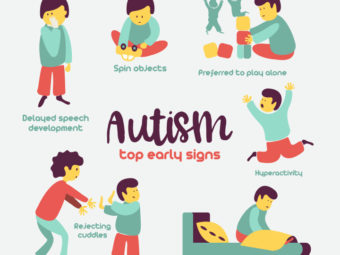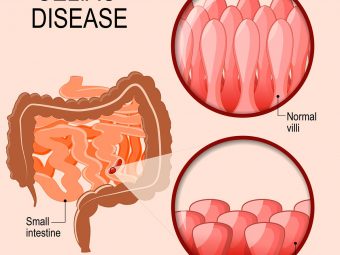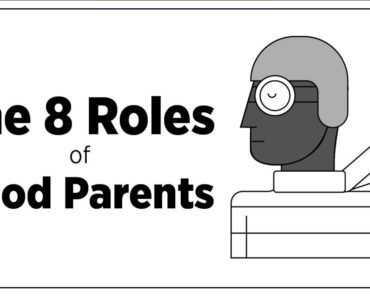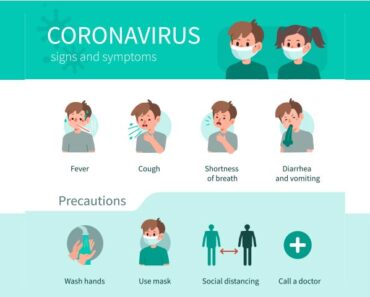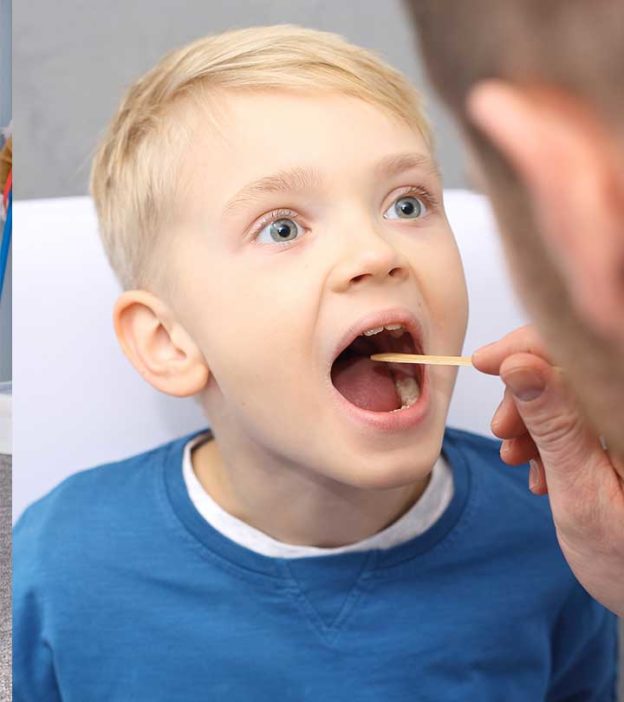
PANDAS syndrome is a condition that affects children. It is characterized by the sudden onset of obsessive-compulsive behaviors and/or tics. The cause is unknown, but it is thought to be anautoimmuneiXA condition characterized by the body’s immune system mistakenly attacking healthy cells, tissues, and organs reaction to a strep infection (1). Treatment typically involves antibiotics and/or immunomodulatory therapy. Read on as we will delve into the causes, symptoms, and treatment options for PANDAS syndrome, and ways to support a child living with this condition.
What Is PANDAS Syndrome?
PANDAS syndrome, or Pediatric Autoimmune Neuropsychiatric Disorders Associated with Streptococcal infections syndrome, is a rare and complex disorder that affects children and adolescents. The exact cause of PANDAS is not known but is believed to be related to the immune system mistakenly targeting the brain’s basal gangliaiXA group of brain structures located in the basal part of brain that plays a crucial role in the movement, learning, and decision-making . It is marked by the abrupt emergence of symptoms of OCD and/or tic disorders, such as Tourette’s Syndrome, after a streptococcal infection (2). The effects of this condition on a child’s quality of life can be significant, and the diagnosis and treatment can be challenging.
How Common Is PANDAS In Children?
PANDAS is more commonly seen in boys than girls, although it can affect both. The exact prevalence of PANDAS is not known, but it is thought to occur in about one in 200 children with obsessive-compulsive disorder (OCD) or tic disorders such as Tourette Syndrome (3).
It is important to note that PANDAS is a provisional diagnosis and not universally accepted by the medical community. The exact cause and mechanism of PANDAS still need to be investigated and fully understood.
Quick fact
What Are The Symptoms And Signs Of PANDAS Syndrome?
The symptoms and signs of PANDAS can vary widely but generally include some of the following:
- Sudden onset of symptoms related to OCD, such as severe anxiety, excessive washing of hands, and checking, counting, or arranging items (5).
- Sudden onset of tic disorders, such as repetitive eye blinking, facial grimacing, shoulder shrugging, or vocalizations such as grunting or throat clearing (5).
- Behavioral changes, such as irritability, mood swings, and difficulty with attention and concentration (6).
- Developmental regression, such as loss of language skills or difficulty with fine motor tasks (7).
- Decreased appetite or difficulty eating (8).
- Sensory sensitivities, such as aversion to certain textures of foods or clothes (5) (7).
Symptoms and signs can appear rapidly after a streptococcal infection, such as scarlet fever or strep throat, and can be preceded by other symptoms like sore throat, fever, or rashes. These symptoms usually last for four to six weeks (4). Also, some children may have the disorder without an initial strep infection, so the onset of symptoms might be unclear (9).
It is important to note that the symptoms of PANDAS can be similar to those of other conditions, such as ADHD (attention deficit hyperactivity disorder) (10) and autism spectrum disorder (11). Therefore, it is important to consult with a pediatrician or a specialist in pediatric infectious disease, neurology, or psychiatry for a proper diagnosis.
What Causes PANDAS Syndrome In Children?
The exact cause of PANDAS is not fully understood. The disorder is thought to be triggered by an infection with certain streptococcal bacteria, such as Streptococcus pyogenes, which causes strep throat and scarlet fever (1).
It is believed that in children with PANDAS, the immune system’s response to the strep infection produces antibodies that mistakenly attack healthy tissue in the brain, leading to inflammation and damage in the basal ganglia and other areas of the brain that control movement, emotions, and behavior (12). This autoimmune response is thought to cause sudden symptoms related to OCD or tic disorders.
It is also suggested that genetics, brain chemistry, and environmental factors may play a role in the development of PANDAS (13). However, more research is needed to understand the complex underlying mechanisms.
Quick fact
Who Is At Risk Of PANDAS Syndrome?
PANDAS typically affects children who have or have recently had a strep infection, such as strep throat or scarlet fever (1). The risk of developing PANDAS is higher in children with recurrent strep infections or who have had a severe or prolonged course of the infection. Still, it can also occur in children without a known history of strep infections. Children with a genetic or environmental predisposition to autoimmune disorders may also be at risk for the condition (13).
The condition is more commonly seen in boys than girls, but it can affect both genders (1). Children with a family history of autoimmune or tic disorders, such as Tourette’s syndrome, may have an increased risk of developing PANDAS (15).
It is important to note that not all children with strep infections will develop PANDAS, and not all children with symptoms of OCD or tic disorders have PANDAS.
How Is PANDAS Syndrome Diagnosed?
PANDAS syndrome is diagnosed through a clinical examination that includes taking a patient’s medical history and conducting a physical examination. To be diagnosed with PANDAS, a patient must have (16):
- OCD, ADHD-like symptoms, or tics
- Symptoms that began between the ages of 3 and 12
- Sudden onset or worsening of symptoms for a brief period
- An established connection between streptococcal infection and the onset or worsening of symptoms, as confirmed by culture or the presence of anti-streptococcal antibodies.
- Association with neurological anomalies such as hyperactivity, anxiety, emotional lability, developmental regression, or mood changes.
PANDAS is a diagnosis of exclusion, meaning a specialist must rule out all other possibilities.
How Is PANDAS Treated In Children?
Treatment for PANDAS typically involves a combination of antibiotics, immunomodulatory therapy, and behavioral therapy. The treatment plans are usually tailored to the child’s needs and may be adjusted as necessary.
- Antibiotics: Antibiotics are used to eradicate the underlying streptococcal infection (17). A course of antibiotics such as penicillin or amoxicillin is usually prescribed for 10 to 14 days.
- Immunomodulation: The PANS Research Consortium’s 2017 treatment guidelines recommend combining immunomodulating therapies. In some cases, these include corticosteroidsiXA class of drugs that mimic the hormones produced by the adrenal glands used to reduce inflammation and suppress the immune system , plasmapheresisiXA medical procedure that involves removing, treating, and returning blood plasma to the body to help treat certain illnesses or disorders , intravenous immunoglobuliniXAlso known as antibodies, are proteins produced by the immune system to protect against foreign invaders like bacteria and viruses , mycophenolate, and rituximab (18).
- Behavioral therapy: Behavioral therapy, such as cognitive-behavioral therapy (CBT) or exposure and response prevention (ERP), can help manage symptoms of OCD and other behavioral issues (19).
It’s important to work with a specialized team of pediatricians, neurologists, and psychiatrists to create an individualized treatment plan that best addresses your child’s specific needs. While PANDAS can be treated, there is no cure for the disorder, so the child will need close monitoring and follow-up care over time to manage symptoms and prevent relapse.
It’s also important to note that the treatment of PANDAS is still debated among the medical community. More research is needed to understand the underlying mechanisms and the most effective treatment options (20).
What’s The Outlook For A Child With PANDAS Syndrome?
It can be difficult for children with acute onset OCD to cope with sudden, overwhelming thoughts and behaviors, such as needing constant reassurance or excessive handwashing. PANS can also cause children to worry about food and their health, leading to severe restrictions and fears of contamination, choking, or vomiting. These fears and behaviors can progress to anorexiaiXA serious eating disorder where individuals suffer from an intense fear of gaining weight and a distorted body image, leading to extreme weight loss and extreme weight loss.
Separation anxiety can also develop abruptly, causing older children to suddenly need to sleep with their parents, which can be a source of distress for the child. Panic attacks are also common, with children experiencing near-constant panic in the early stages. These changes can be incredibly difficult for children and their families, and it’s important to provide support and understanding (21).
The prognosis for children with PANDAS can vary widely depending on the severity of symptoms, the effectiveness of treatment, and the child’s response to that treatment. With appropriate treatment, many children with PANDAS can experience significant improvement in their symptoms, but some may continue to experience symptoms over the long term.
Quick tip
Keep a symptom diary to track patterns and triggers of PANDAS and adjust treatment plans with the help of a healthcare provider.
Are There Any Potential Complications?
The complications may vary depending on the severity of the disorder but can include the following.
- Persistent symptoms: PANDAS is known for the sudden onset of symptoms, but the symptoms may persist even after the strep infection has been treated, and if left untreated, they may worsen over time (4).
- Functional impairment: PANDAS can cause significant functional impairment (7), interfering with a child’s ability to attend school, participate in social activities, and maintain relationships with family and friends.
- Developmental regression: PANDAS can cause developmental regression, which is a loss of previously acquired skills or abilities, and can have a negative impact on a child’s development (7).
- Side effects from treatment: Medications and other treatments used for PANDAS can cause side effects that can be uncomfortable or harmful. Discussing these potential side effects with your child’s healthcare provider is important.
Trivia
Many children can fully recover from streptococcal infections. Others may experience persistent neuropsychiatric symptoms or experience exacerbated symptoms each time they are infected. It is not currently possible to predict which children will be affected by these symptoms or how severe they will be. Comorbid tics are associated with a decline in handwriting skills and school performance, as well as visual and motor impairments, sleep disruption, eating disorders, separation anxiety, and a lower overall quality of life compared to children without tics (22). Early diagnosis and treatment with an appropriate multidisciplinary approach can improve affected children’s outcomes. Close monitoring and follow-up care will be necessary to manage symptoms and prevent relapse (5).
1. How long does PANDAS disorder last?
PANDAS is a rare disorder that typically lasts several weeks to several months. However, in some cases, PANDAS symptoms can persist for extended periods (4).
2. Are PANS and PANDAS syndrome the same?
PANS (Pediatric Acute-onset Neuropsychiatric Syndrome) and PANDAS are related conditions characterized by the sudden onset of neuropsychiatric symptoms. PANDAS is a subtype of PANS caused by a streptococcal infection. PANS can have other causes, including infections, metabolic disturbances, or unknown reasons (23).
3. What happens if PANDAS goes untreated?
If PANDAS goes untreated, symptoms can persist and worsen, affecting daily life, school performance, and social interactions. It can lead to other complications such as deterioration in academic performance, deteriorating mental health conditions, and other health problems such as rheumatic feveriXA dangerous disease caused by strep throat that can harm the heart, joints, and brain if not treated promptly (24).
4. Is PANDAS a mental illness?
PANDAS is a disorder that causes sudden onset of neuropsychiatric symptoms such as OCD, tic disorders, and behavioral changes. It results from an abnormal immune response to streptococcal infection and inflammation in the brain. It is not considered a primary mental illness, but its symptoms can affect a child’s mental health (25).
5. Is PANDAS part of Autism?
PANDAS and Autism are distinct conditions, but some children may have both. PANDAS is a disorder caused by an abnormal immune response resulting in the sudden onset of neuropsychiatric symptoms. Autism is a neurodevelopmental disorder characterized by difficulty in social interaction, communication, and repetitive behaviors. Some children with PANDAS may have symptoms that overlap with autism and vice-versa (11) (26).
PANDAS syndrome is a complex condition, and managing it is no easy task. However, understanding and recognizing the signs of PANDAS syndrome can help make all the difference to those affected. With proper education, support, and treatment from medical professionals, those with PANDAS syndrome can lead fulfilling lives even when dealing with its complexities.
Key Pointers
- PANDAS is a rare disorder that affects children and is characterized by the sudden onset of OCD and/or tic behaviors.
- The exact cause of PANDAS is unknown but thought to be an autoimmune reaction to a strep infection.
- Treatment typically includes antibiotics and/or immunomodulatory therapy.
- PANDAS can significantly impact a child’s quality of life, and diagnosis and treatment can be challenging.
- The medical community does not universally accept the PANDAS diagnosis, and ongoing research is needed to understand the disorder better.


